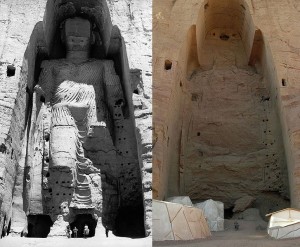-
-
Sh Sanghvi’s second point was that, as a consequence of such destruction (which we now know is not supported by historical records) Buddhism declined in India – that land of its birth.
Let us start by what Dr B R Ambedkar had to say on the decline of Buddhism in India:
“..There can be no doubt that the fall of Buddhism in India was due to the invasions of the Musalmans…Islam came out as the enemy of the ‘But’. The word ‘But,’ as everybody knows, is an Arabic word and means an idol. Not many people, however, know that the derivation of the word ‘But’ is the Arabic corruption of Buddha. Thus the origin of the word indicates that in the Moslem mind idol worship had come to be identified with the Religion of the Buddha. To the Muslims, they were one and the same thing. The mission to break the idols thus became the mission to destroy Buddhism. Islam destroyed Buddhism not only in India but wherever it went. Before Islam came into being Buddhism was the religion of Bactria, Parthia, Afghanistan, Gandhar and Chinese Turkestan, as it was of the whole of Asia….”

- Writing in “The Historical Interaction between the Buddhist and Islamic Cultures before the Mongol Empire”, Alexander Berzin notes that :
- The Hindus and Jains had no universities or large monasteries. Their monks lived alone or in small groups in remote regions, studying and meditating privately, with no community rituals or ceremonies. Since they posed no threat, it was not worth the invaders’ time or efforts to destroy them. They damaged only the Hindu and Jain temples found in the major cities for laypeople. The Buddhists, on the other hand, had large, imposing monastic universities, surrounded by high walls and fortified by the local kings. Their razing clearly had military significance.
- When Hinduism identified Buddha as a manifestation of its supreme god Vishnu, the Buddhists did not object. In fact, throughout northern India, Kashmir, and Nepal, Buddhism was already mixed with many elements of devotional Hinduism. Therefore, when the major monasteries were destroyed, most Buddhists were easily absorbed into Hinduism. They could still focus their devotion on Buddha and be considered good Hindus. Hinduism and Jainism, on the other hand, were more oriented to laypeople’s practice in the home and did not require monastic institutions.
- Furthermore, Hindus and Jains were useful to the Muslim conquerors. The Hindus had a warrior caste that could be conscripted into service, while the Jains were the major local merchants and sources of tax. The Buddhists, on the other hand, did not have a distinguishing occupation or service as a people as a whole. They no longer played a role in interregional trade as they had centuries earlier when Buddhist monasteries dotted the Silk Route. Therefore, whatever efforts there were for conversion to Islam were directed primarily toward them.
- May Tathagata show you the way.
-
Posted from Diigo. The rest of my favorite links are here.